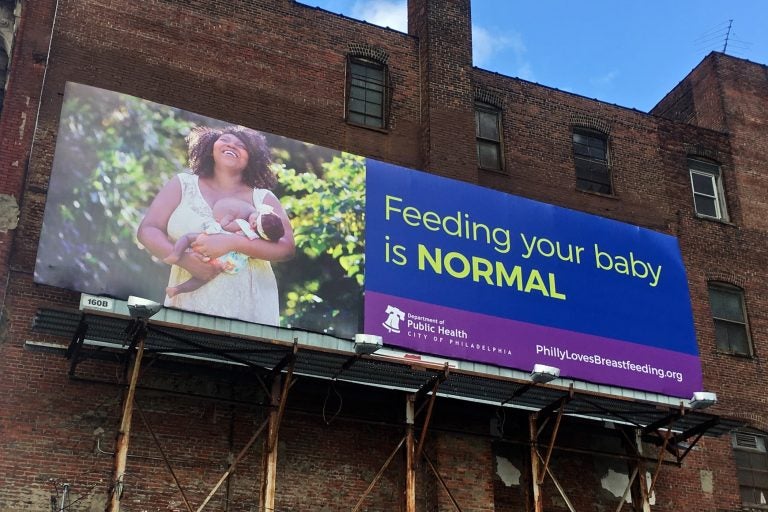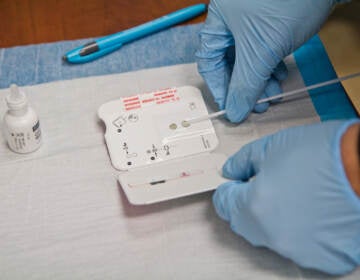To promote breastfeeding among women of color, Philly campaign features black moms
Philadelphia's Department of Public Health has launched a new campaign to promote breastfeeding, especially among women of color.
Listen 1:16
A billboard on Callowhill Street is part of Philadelphia's campaign in support of breastfeeding features a photo taken by Vanessa A. Simmons of a city woman. (Emma Lee/WHYY)
Philadelphia’s Department of Public Health has launched a new campaign to promote breastfeeding, especially among women of color.
Black infants in the city are twice as likely to die as white infants. They are more likely to have a lower birth rate, and they are more likely die of a sleep disorder that can be prevented. This trend is not unique to Philadelphia — infant mortality rates among African-Americans are notably higher nationwide.
The reasons for these disparities have been the subject of much scientific research and debate. While earlier theories suggested it had to do with education levels and poverty among African-American women, recent studies found that black women are more likely to have preterm babies regardless of their educational attainment. Leading research points to the impact that racism can have on the stress and experience of black mothers.
While it’s not a silver bullet, breastfeeding has demonstrated health benefits for mothers and infants. For babies, it reduces risk of sudden infant death syndrome, obesity, asthma, and complications of preterm birth. For mothers, it reduces the risk of Type 2 diabetes, high blood pressure, ovarian and breast cancers. Economically, breastfeeding has been shown to reduce health care costs for families. And yet, according to the Centers for Disease Control and Prevention, black infants are 21 percent less likely to be breastfed than white infants.
To try to bridge this divide, the city wanted to put out some promotional material, destigmatizing the practice of breastfeeding for mothers, families, employers, and passers-by.
In her position as head of the division of Maternal Child and Family Health in the Philadelphia Department of Public Health, Dr. Sara Kinsman said she started looking around for some stock photos of women breastfeeding that would be representative of Philly families to promote the campaign.
“There were not a lot of positive images of women breastfeeding their babies, particularly African-American women and minority women,” said Kinsman.
So, the division set out to find women that the city’s health clinics served and use their images for billboards and promotional material to be distributed as part of the Philly Loves Breastfeeding campaign.
“Our campaign just shows real Philadelphia moms throughout the city breastfeeding their baby — just normal, not a big deal, this is how you feed a baby,” Kinsman said.
Making resources, institutions available
The city is not alone in working to normalize breastfeeding among African-American mothers. Jabina Coleman, who works with African-American women on maternal health, helps organize an annual barbecue to promote awareness about breastfeeding. She stressed that the numbers of black moms who breastfeed are going up — and the women she works with want to breastfeed.
“It’s just a matter of making sure the resources and institutions are there for them,” she said.
The reasons why black mothers breastfeed less often are varied. Some researchers have pointed to fewer breastfeeding resources in hospitals that serve black and minority communities. Others have said it has to do with stigma that still exists in the African-American community surrounding breastfeeding — and the lack of representation in breastfeeding and lactation materials that reinforces that.
Socioeconomically, minority women are also more likely to need to return to work or school earlier than white women, and that can make breastfeeding or pumping more difficult — despite regulations that workplaces accommodate nursing mothers. The city was also the first in the U.S. to legally protect a woman’s right to breastfeed in public in 1997.
But Kinsman said it doesn’t always unfold as it should.
While workplaces might have the best intentions, employers might not always know how to accommodate their employees by providing the required space for breastfeeding or pumping.
“Some employers are very well meaning, but they might not know what the right kind of spot is for a woman to have privacy,” said Kinsman. “Helping them be able to problem solve, ‘Somebody needs to leave the workplace at this time or that time — how can they actually?’ ”
Joy Ahn, a public health nurse who works with first-time, low-income mothers, said she sees her clients in school struggle with this decision all the time.
“When I would ask a pregnant mom, have you thought about what you want to feed your baby, I would get a frequent response of, ‘Well, I want to breastfeed, but I can’t because I have to go back to school.’ ”
Ahn is working with the Campaign for Breastfeeding-Friendly Schools, a coalition of organizations focused on advancing policy that would protect parenting students from being penalized for pumping or breastfeeding.
“The two things should not be mutually exclusive, and, for a lot of people, they are,” she said.
WHYY is your source for fact-based, in-depth journalism and information. As a nonprofit organization, we rely on financial support from readers like you. Please give today.





